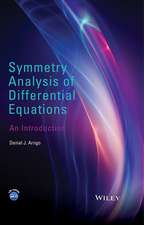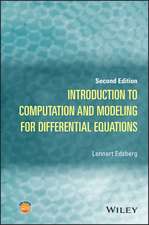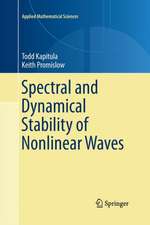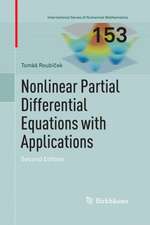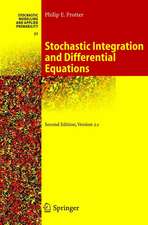Geometry of Continued Fractions: Algorithms and Computation in Mathematics, cartea 26
Autor Oleg Karpenkoven Limba Engleză Hardback – 23 aug 2013
The reader will find an overview of current progress in the geometric theory of multidimensional continued fractions accompanied by currently open problems. Whenever possible, we illustrate geometric constructions with figures and examples. Each chapter has exercises useful for undergraduate or graduate courses.
Din seria Algorithms and Computation in Mathematics
- 15%
 Preț: 671.14 lei
Preț: 671.14 lei - 18%
 Preț: 728.91 lei
Preț: 728.91 lei - 15%
 Preț: 602.42 lei
Preț: 602.42 lei -
 Preț: 488.92 lei
Preț: 488.92 lei - 15%
 Preț: 643.00 lei
Preț: 643.00 lei -
 Preț: 405.06 lei
Preț: 405.06 lei -
 Preț: 402.00 lei
Preț: 402.00 lei - 18%
 Preț: 738.69 lei
Preț: 738.69 lei -
 Preț: 397.97 lei
Preț: 397.97 lei - 18%
 Preț: 1121.13 lei
Preț: 1121.13 lei - 15%
 Preț: 497.22 lei
Preț: 497.22 lei - 20%
 Preț: 656.36 lei
Preț: 656.36 lei - 15%
 Preț: 479.22 lei
Preț: 479.22 lei -
 Preț: 397.38 lei
Preț: 397.38 lei - 15%
 Preț: 591.14 lei
Preț: 591.14 lei -
 Preț: 393.35 lei
Preț: 393.35 lei - 20%
 Preț: 330.42 lei
Preț: 330.42 lei - 18%
 Preț: 962.35 lei
Preț: 962.35 lei - 23%
 Preț: 638.32 lei
Preț: 638.32 lei -
 Preț: 398.15 lei
Preț: 398.15 lei - 18%
 Preț: 786.98 lei
Preț: 786.98 lei - 15%
 Preț: 701.06 lei
Preț: 701.06 lei - 18%
 Preț: 756.99 lei
Preț: 756.99 lei - 20%
 Preț: 1153.97 lei
Preț: 1153.97 lei - 18%
 Preț: 965.52 lei
Preț: 965.52 lei - 20%
 Preț: 341.48 lei
Preț: 341.48 lei -
 Preț: 499.24 lei
Preț: 499.24 lei
Preț: 596.55 lei
Preț vechi: 701.82 lei
-15% Nou
Puncte Express: 895
Preț estimativ în valută:
114.15€ • 119.48$ • 95.01£
114.15€ • 119.48$ • 95.01£
Carte tipărită la comandă
Livrare economică 31 martie-14 aprilie
Preluare comenzi: 021 569.72.76
Specificații
ISBN-13: 9783642393679
ISBN-10: 3642393675
Pagini: 424
Ilustrații: XVII, 405 p.
Dimensiuni: 155 x 235 x 28 mm
Greutate: 0.77 kg
Ediția:2013
Editura: Springer Berlin, Heidelberg
Colecția Springer
Seria Algorithms and Computation in Mathematics
Locul publicării:Berlin, Heidelberg, Germany
ISBN-10: 3642393675
Pagini: 424
Ilustrații: XVII, 405 p.
Dimensiuni: 155 x 235 x 28 mm
Greutate: 0.77 kg
Ediția:2013
Editura: Springer Berlin, Heidelberg
Colecția Springer
Seria Algorithms and Computation in Mathematics
Locul publicării:Berlin, Heidelberg, Germany
Public țintă
GraduateCuprins
Preface.- Introduction.- Part 1. Regular continued fractions: Chapter 1. Classical notions and definitions.- Chapter 2. On integer geometry.- Chapter 3. Geometry of regular continued fractions.- Chapter 4. Complete invariant of integer angles.- Chapter 5. Integer trigonometry for integer angles.- Chapter 6. Integer angles of integer triangles.- Chapter 7. Continued fractions and SL(2; Z) conjugacy classes. Elements of Gauss Reduction Theory. Markoff spectrum.- Chapter 8. Lagrange theorem.- Chapter 9. Gauss-Kuzmin statistics.- Chapter 10. Geometric approximation aspects.- Chapter 11. Geometry of continued fractions with real elements and the second Kepler law.- Chapter 12. Integer angles of polygons and global relations to toric singularities.- Part 2. Klein polyhedra: Chapter 13. Basic notions and definitions of multidimensional integer geometry.- Chapter 14. On empty simplices, pyramids, parallelepipeds.- Chapter 15. Multidimensional continued fractions in the sense of Klein.- Chapter16. Dirichlet groups and lattice reduction.- Chapter 17. Periodicity of Klein polyhedra. Generalization of Lagrange theorem.- Chapter 18. Multidimensional Gauss-Kuzmin statistics.- Chapter 19. On construction of multidimensional continued fractions.- Chapter 20. Gauss Reduction in higher dimensions.- Chapter 21. Decomposable forms. Relation to Littlewood and Oppenheim conjectures.- Chapter 22. Approximation of maximal commutative subgroups.- Chapter 23. Other generalizations of continued fractions.- Bibliography.
Recenzii
“Throughout the book many theorems are accompanied by constructive algorithms. Due to its rich content and connections to several parts of mathematics this volume will be of interest to graduate students and researchers not only in number theory and discrete geometry.” (C. Baxa, Monatshefte für Mathematik, Vo. 180, 2016)
“Karpenkov … begins with a distinctive treatment of continued fraction foundations emphasizing lattice geometry. One-dimensional continued fractions connect to two-dimensional lattices--very apt for illustration. … Summing Up: Recommended. Upper-division undergraduates through researchers/faculty.” (D. V. Feldman, Choice, Vol. 51 (10), June, 2014)
“The book is well written and is easy to read and navigate. … The book features a number of helpful illustrations and tables, a detailed index, and a large bibliography.This text is likely to become a valuable resource for researchers and students interested in discrete geometry and Diophantine approximations, as well as their rich interplay and many connections.” (Lenny Fukshansky, zbMATH, Vol. 1297, 2014)
“Karpenkov … begins with a distinctive treatment of continued fraction foundations emphasizing lattice geometry. One-dimensional continued fractions connect to two-dimensional lattices--very apt for illustration. … Summing Up: Recommended. Upper-division undergraduates through researchers/faculty.” (D. V. Feldman, Choice, Vol. 51 (10), June, 2014)
“The book is well written and is easy to read and navigate. … The book features a number of helpful illustrations and tables, a detailed index, and a large bibliography.This text is likely to become a valuable resource for researchers and students interested in discrete geometry and Diophantine approximations, as well as their rich interplay and many connections.” (Lenny Fukshansky, zbMATH, Vol. 1297, 2014)
Notă biografică
For different subjects contributed to this book, the author was awarded a Fellowship of the City of Paris (France), a Lise Meitner Fellowship (Austria) and the Moscow Mathematical Society Prize (Russia).
Textul de pe ultima copertă
Traditionally a subject of number theory, continued fractions appear in dynamical systems, algebraic geometry, topology, and even celestial mechanics. The rise of computational geometry has resulted in renewed interest in multidimensional generalizations of continued fractions. Numerous classical theorems have been extended to the multidimensional case, casting light on phenomena in diverse areas of mathematics. This book introduces a new geometric vision of continued fractions. It covers several applications to questions related to such areas as Diophantine approximation, algebraic number theory, and toric geometry.
The reader will find an overview of current progress in the geometric theory of multidimensional continued fractions accompanied by currently open problems. Whenever possible, we illustrate geometric constructions with figures and examples. Each chapter has exercises useful for undergraduate or graduate courses.
The reader will find an overview of current progress in the geometric theory of multidimensional continued fractions accompanied by currently open problems. Whenever possible, we illustrate geometric constructions with figures and examples. Each chapter has exercises useful for undergraduate or graduate courses.
Caracteristici
New approach to the geometry of numbers, very visual and algorithmic Numerous illustrations and examples Problems for each chapter Includes supplementary material: sn.pub/extras

